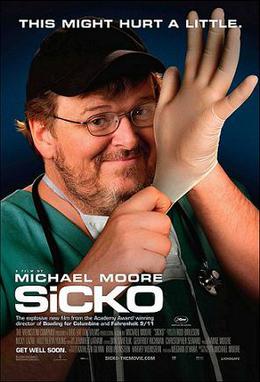Sicko
Sicko is a 2007 American documentary film directed, produced, and narrated by Michael Moore. The film investigates health care in the United States, focusing on its health insurance and the pharmaceutical industry. Moore compares the for-profit, non-universal U.S. system with the universal health care systems of Canada, the United Kingdom, France, and Cuba.
Synopsis[edit | edit source]
Sicko opens with a series of stories about individuals who did not have health insurance and faced tragic consequences as a result. Moore then shifts focus to individuals who have health insurance but are denied treatment by their insurance companies. The film presents a critical analysis of the health insurance industry, highlighting the gap between what is paid in premiums and what is actually provided in terms of care.
Moore takes his audience on a journey to Canada, the United Kingdom, and France to illustrate how universal health care systems can provide better care for their citizens without the direct cost to the patient seen in the United States. In each country, Moore interviews patients and health care professionals about their experiences, showcasing the benefits of a system where health care is considered a right rather than a privilege.
The film culminates in a trip to Cuba, where Moore seeks medical treatment for 9/11 rescue workers who have been denied care in the United States. The contrast between the free care received by these workers in Cuba and their treatment in the U.S. serves as a poignant critique of the American health care system.
Reception[edit | edit source]
Sicko was critically acclaimed upon its release, praised for its compelling narrative and the poignant questions it raises about the American health care system. It was nominated for an Academy Award for Best Documentary Feature but did not win. The film sparked debate and discussion about health care reform in the United States, contributing to the conversations that would eventually lead to the passage of the Affordable Care Act.
Impact[edit | edit source]
The impact of Sicko extends beyond its initial release, as it continues to be used in discussions about health care reform. Moore's documentary played a role in highlighting the deficiencies of the U.S. health care system and the need for comprehensive reform. It has been credited with helping to shift public opinion in favor of universal health care, laying the groundwork for future policy changes.
Controversy[edit | edit source]
While Sicko was praised by many, it also faced criticism, particularly from those who support the current U.S. health care system and those who argue that Moore's portrayal of universal health care systems is overly idealistic. Critics contend that the film simplifies complex issues and neglects the challenges and drawbacks of universal health care.
See Also[edit | edit source]
Navigation: Wellness - Encyclopedia - Health topics - Disease Index - Drugs - World Directory - Gray's Anatomy - Keto diet - Recipes
Search WikiMD
Ad.Tired of being Overweight? Try W8MD's physician weight loss program.
Semaglutide (Ozempic / Wegovy and Tirzepatide (Mounjaro / Zepbound) available.
Advertise on WikiMD
WikiMD is not a substitute for professional medical advice. See full disclaimer.
Credits:Most images are courtesy of Wikimedia commons, and templates Wikipedia, licensed under CC BY SA or similar.Contributors: Prab R. Tumpati, MD

